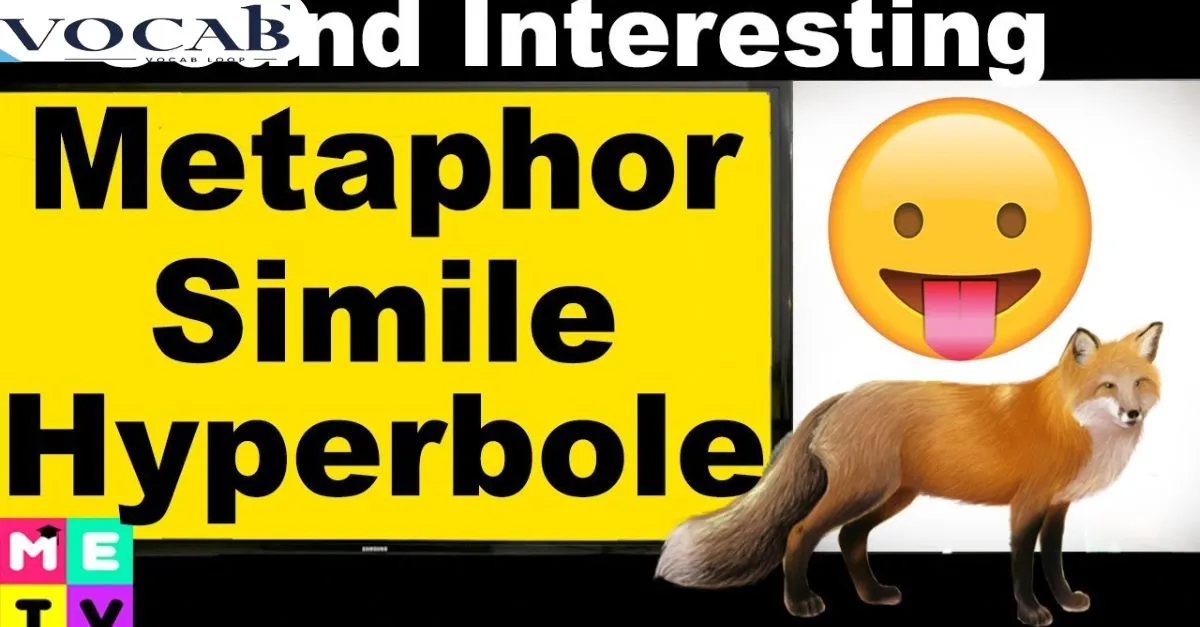Language is full of word magic, and two tools—metaphor and hyperbole—make it especially colorful. But many people confuse these literary devices, wondering about their meanings, usage, and even the right spelling.
Understanding metaphor vs hyperbole isn’t just for writers; it’s essential for anyone who wants to communicate with clarity and creativity. This guide dives deep into these terms, making their differences crystal clear.
What Is There Confusion Metaphor vs Hyperbole?
The confusion between metaphor vs hyperbole arises because both are part of figurative language. While both make language expressive, they serve very different purposes. A metaphor creates symbolic language, such as saying, “The sky is a blanket of stars.” This is a direct comparison that transforms how we visualize the sky.
In contrast, hyperbole relies on exaggerated expressions to emphasize an idea, such as, “I’m so tired I could sleep for a year.” It’s dramatic and isn’t meant to be taken literally. Many people mix them up because both often appear in poetic expressions or vivid writing, but their effects are distinct.
What Is a Metaphor?
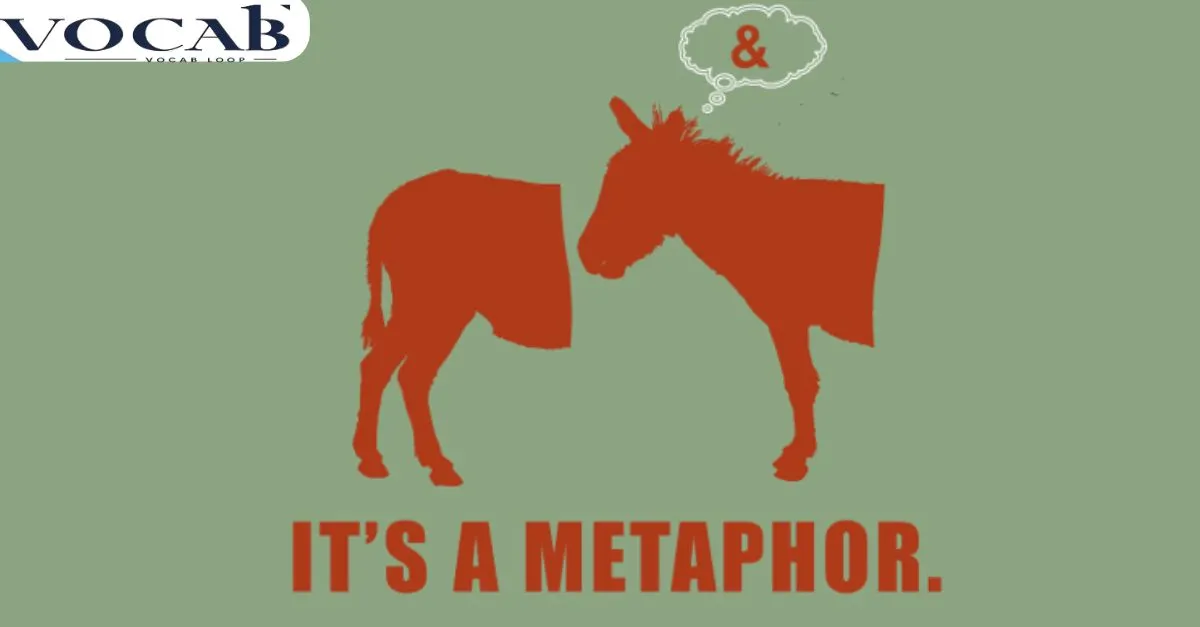
Is the Metaphor Word Correct?
Yes, “metaphor” is spelled correctly in both American and British English, and its pronunciation, /ˈmetəˌfɔr/, remains the same across these regions. Despite this consistency in spelling and pronunciation, the use of metaphors may vary slightly depending on cultural context.
For example, metaphors in American English may reflect more modern or casual expressions, while British English might lean toward more traditional or formal imagery. However, the core concept of metaphors—creating symbolic meaning through comparison—remains unchanged in both dialects.
Definition:
A metaphor is a figure of speech that compares two things without using “like” or “as.” For example, “Life is a rollercoaster” equates life with the ups and downs of a rollercoaster, creating vivid imagery.
Meaning:
Metaphors help convey abstract ideas in a relatable way. By drawing comparisons, they transform ordinary writing into symbolic language full of imaginative speech.
Usage:
Metaphors are used everywhere—from literature to advertising. For example, Shakespeare’s “All the world’s a stage” compares life to a stage, turning a simple thought into a profound idea.
This creative writing technique is essential for expressing depth and meaning.
What Is Hyperbole?
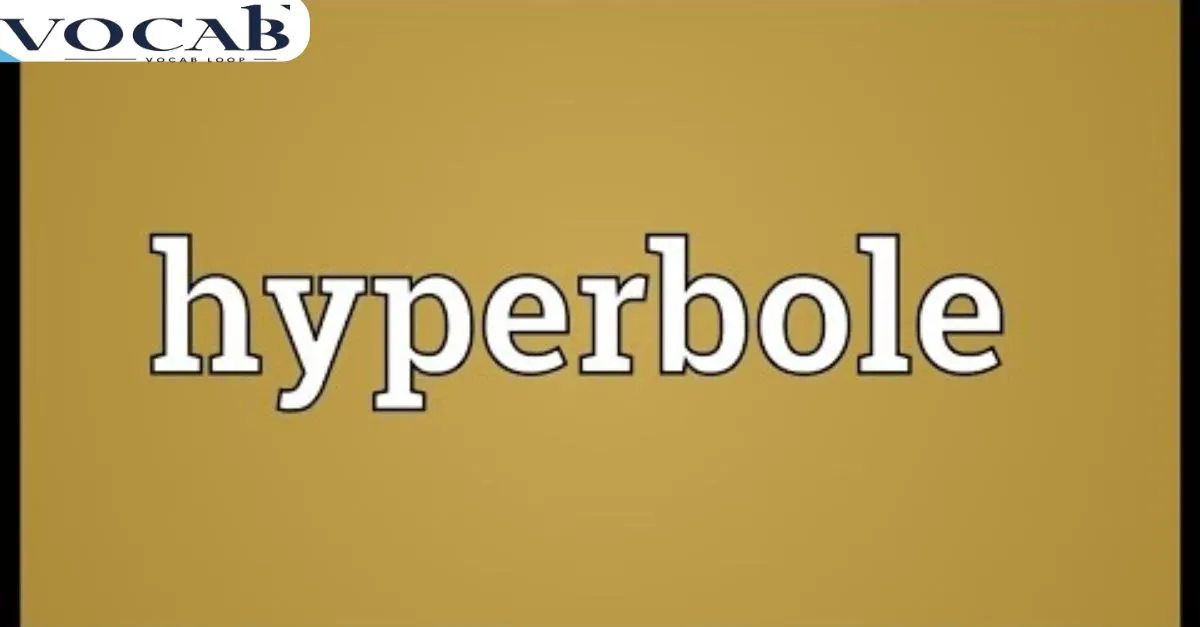
Is the Hyperbole Word Correct?
Yes, “hyperbole” is correctly spelled and pronounced as /haɪˈpɜːrbəli/ in both American and British English. The world’s dramatic flair matches its meaning, emphasizing exaggeration for effect. Whether in casual conversation or literary works, hyperbole amplifies emotions or ideas, making them more memorable.
Its pronunciation is consistent across regions, and its exaggerated nature is reflected not just in its sound but also in its use—making it a powerful tool for creating vivid, impactful expressions in writing and speech.
Definition:
Hyperbole is a literary tool that uses deliberate exaggeration to emphasize a point. For example, “I have a million things to do today” amplifies the speaker’s busy schedule but isn’t meant to be taken literally.
Meaning:
Hyperboles add humor, drama, or intensity to a statement. They rely on overemphasis to capture attention or make an impression.
Usage:
Hyperboles appear in casual conversations, advertisements, and speeches. They help evoke strong emotions or humor, like saying, “This bag weighs a ton,” to highlight heaviness in a playful way.
Quick Summary
| Aspect | Metaphor | Hyperbole |
| Definition | Direct comparison between two things. | Exaggeration to emphasize an idea. |
| Purpose | To create symbolic meaning. | To dramatize or intensify emotions. |
| Example | “Her smile is sunshine.” | “I’ve told you a million times!” |
| Usage | Common in poetry and descriptive writing. | Used in humor, speeches, and casual talk. |
| Effect | Adds depth and creates vivid imagery. | Captures attention and evokes strong emotions. |
| Literal or Figurative | Always figurative; not meant literally. | Often literal exaggeration, not factual. |
| Complexity | Subtle and thought-provoking. | Bold and dramatic. |
| Application | Best for reflective or creative contexts. | Best for humor or dramatic emphasis. |
Metaphor vs Hyperbole as Parts of Speech
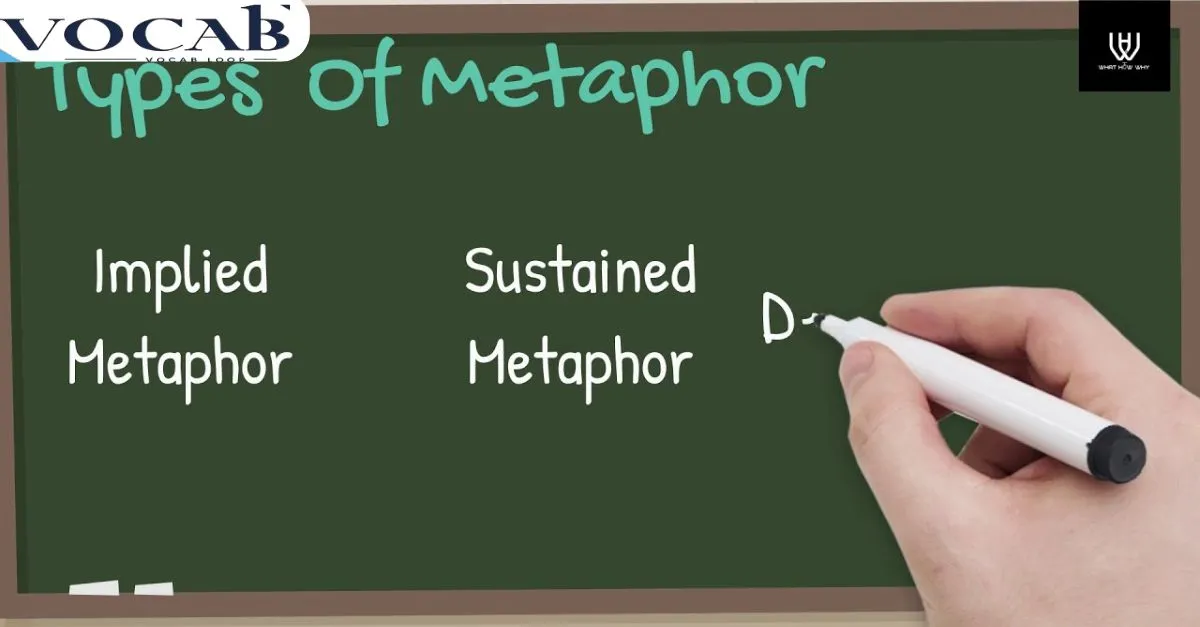
A metaphor can function as a noun, verb, or adjective. For example, in “Her smile lit up the room,” “lit up” serves as a metaphor for brightness and joy.
In contrast, hyperboles usually act as modifiers or intensifiers, such as in “I’m drowning in paperwork.” This adds dramatic emphasis.
Pronunciation of Metaphor vs Hyperbole
The word metaphor is pronounced as /ˈmetəˌfɔr/, while hyperbole is pronounced as /haɪˈpɜːrbəli/.
Both words are spelled the same in British and American English, ensuring no regional variations in writing.
Side-by-Side Comparison Metaphor vs Hyperbole
| Aspect | Metaphor | Hyperbole |
| Definition | Direct comparison between two things. | Deliberate exaggeration for emphasis. |
| Purpose | To create symbolic meaning. | To dramatize or emphasize ideas. |
| Example | “Her eyes are diamonds.” | “I’ve told you a thousand times!” |
Which One Is More Acceptable: Metaphor vs Hyperbole?
Both metaphor and hyperbole are widely accepted in English, but their use depends on the context. Metaphors are more versatile because they are subtle and often embedded in both formal and informal communication. For example, metaphors frequently appear in speeches, essays, and even casual dialogue to add depth or a creative touch.
Hyperboles, on the other hand, tend to be more dramatic and playful, making them better suited for informal situations, advertisements, and humorous writing. In professional or academic settings, overusing hyperbole can seem exaggerated or unprofessional, whereas metaphors can enhance the sophistication of the text.
Metaphor in British English and American English
The word metaphor is consistent across British and American English, both in spelling and usage. The pronunciation, /ˈmetəˌfɔr/, does not vary significantly. However, the examples of metaphors may differ slightly due to cultural context.
For instance, an American writer might say, “The subway is a sardine can,” referring to crowded public transport, whereas a British author could write, “The queue is a snake,” symbolizing its winding form. Despite these differences, the function and meaning of metaphors remain universal.
Hyperbole in British English and American English
Similarly, the spelling of hyperbole remains unchanged in both British and American English, pronounced as /haɪˈpɜːrbəli/. However, its usage may reflect regional preferences. For example, an American might use hyperbole in phrases like.
“I’m freezing to death,” while a British speaker might exaggerate by saying, “It’s cold enough to turn brass monkeys blue.” Both examples showcase the playful, dramatic nature of hyperboles in everyday speech.
Common Mistakes and How to Avoid Them
One common mistake is confusing metaphors with hyperboles, treating both as interchangeable. For instance, saying, “Her eyes are the stars of the sky,” is a metaphor, not a hyperbole. Another error involves overusing hyperboles, which can dilute their impact.
For example, using phrases like “I’ve waited forever” too frequently can make writing seem repetitive and lose its dramatic effect. To avoid these issues, focus on clarity and purpose when using figurative expressions.
Trick to Remember the Difference: Metaphor vs Hyperbole
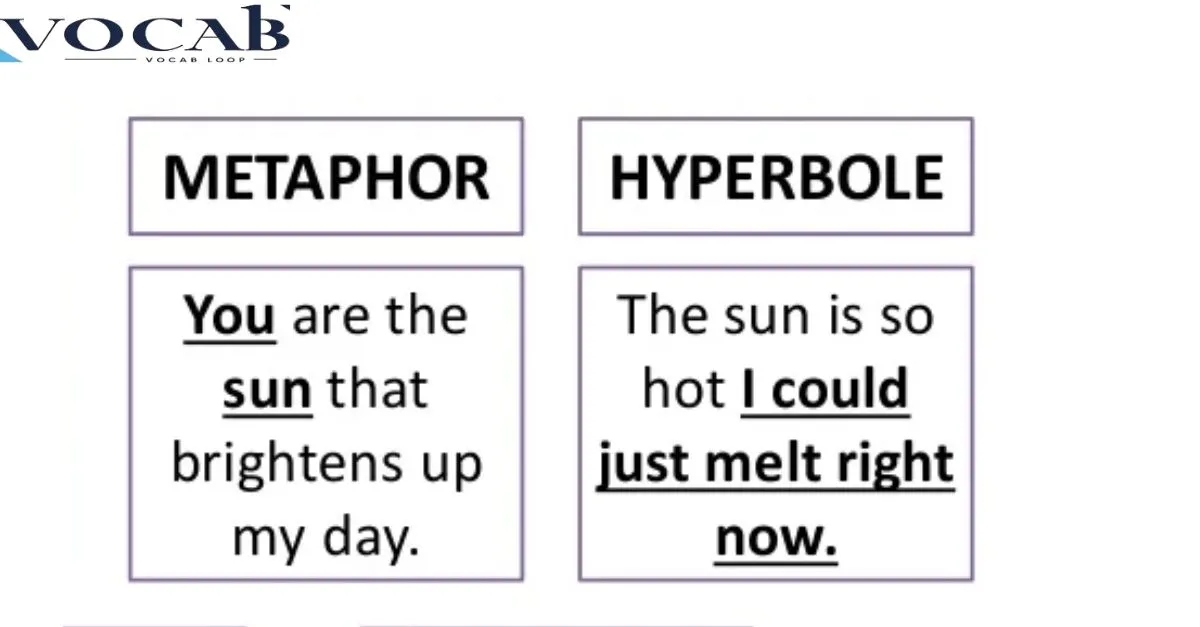
A simple way to differentiate them: Metaphors make you think, hyperboles make you feel. A metaphor transforms understanding by linking two concepts, while hyperbole exaggerates reality to stir emotions.
For example, the metaphor “Time is a thief” encourages reflection, whereas the hyperbole “I’ve been waiting for ages” evokes frustration. Think of metaphors as subtle writing tips and hyperboles as bold language tricks.
Origins of Metaphor vs Hyperbole
Metaphor:
Metaphor comes from the Greek word metaphora, meaning “to transfer.” This origin reflects the term’s purpose: transferring meaning from one object to another to create a connection.
Aristotle’s writings heavily influenced the use of metaphors in Western literature, where he described them as essential for effective communication and imaginative speech.
Hyperbole:
Hyperbole originates from the Greek word hyperbolē, meaning “excess” or “throwing beyond.” Ancient Greek rhetoric used hyperboles to emphasize ideas in dramatic ways.
Over time, this poetic device became a staple of literary works, especially in comedies and speeches.
Synonyms of Metaphor vs Hyperbole
Metaphor:
- Simile
- Analogy
- Allegory
- Symbolism
- Comparison
- Parable
- Representation
- Imagery
- Allusion
- Personification
Hyperbole:
- Overstatement
- Exaggeration
- Amplification
- Dramatic language
- Overemphasis
- Intensification
- Over-the-top expression
- Hyperbolic phrase
- Magnification
- Grandiosity
Sentences in Daily Usage of Metaphor vs Hyperbole
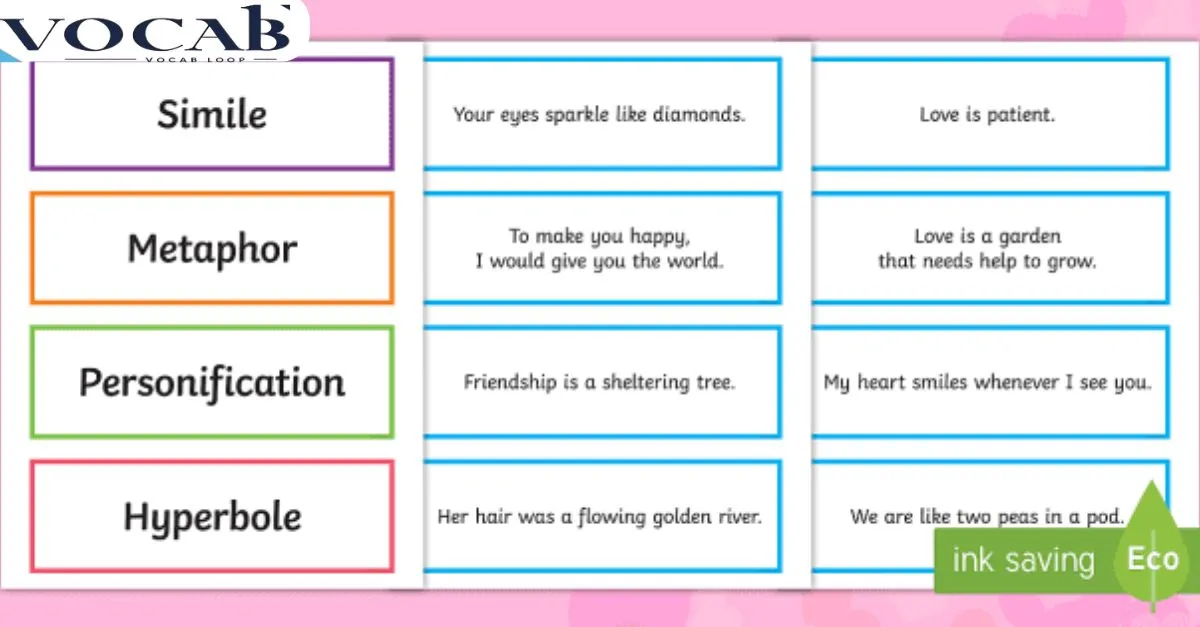
Metaphor:
- “Her voice is music to my ears.”
- “The world’s a stage.”
- “He has a heart of stone.”
- “The curtain of night fell upon us.”
- “Life is a journey, not a destination.”
- “The snow was a white blanket.”
- “Time is a thief that steals our youth.”
- “His words cut deeper than a knife.”
- “The calm lake was a mirror.”
- “She has a bubbly personality.”
Hyperbole:
- “I’ve told you a thousand times!”
- “This bag weighs a ton.”
- “I’m so hungry I could eat a horse.”
- “He’s as old as the hills.”
- “I’m drowning in paperwork.”
- “This is the worst day of my life.”
- “I waited for an eternity.”
- “She’s running faster than the wind.”
- “My phone battery lasts forever.”
- “The test was so hard it broke my brain.”
FAQs
Are metaphors and hyperboles the same?
No, metaphors are comparisons, while hyperboles are exaggerated statements.
Can metaphors and hyperboles be used together?
Yes, combining them can create powerful effects in writing.
Are hyperboles suitable for formal writing?
They are best used sparingly in formal contexts.
How do metaphors enhance creative writing?
They make abstract ideas tangible and relatable.
Why is figurative language important?
It makes writing engaging, memorable, and expressive.
Conclusion
Metaphor vs Hyperbole is essential for mastering figurative language. These literary tools bring life to words, allowing writers to express ideas with creativity and impact. By knowing their definitions, meanings, and usage, you can wield them effectively in your own writing.
Whether you’re crafting a heartfelt speech, a persuasive ad, or just adding flair to everyday conversation, metaphors and hyperboles are your secret to vivid, colorful writing.

Alex Hormozi is a seasoned blogger at Vocab Loop, known for his deep insights into language, vocabulary, and grammar. With years of experience in writing, Alex shares practical tips and effective strategies to help readers improve their linguistic skills and enhance their writing abilities.

